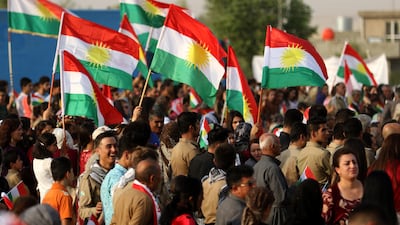On the eve of their scheduled independence referendum on Monday, the Kurds once again find themselves with no friends but the mountains.
A major push by almost all interested parties to get the leadership of the Kurdistan Regional Government (KRG) in Iraq to cancel, or at least postpone, the non-binding referendum appears to be failing. KRG head Masoud Barzani on Friday vowed that the vote would go ahead.
Opposition from some quarters was predictable. Iraq, Iran and Turkey held an extremely unusual trilateral event on the sidelines of the UN General Assembly meeting in New York last week to emphasise their joint "unequivocal opposition to the referendum," and vowed to "consider taking counter-measures in coordination" with each other if it is held.
However, strong opposition has also come from the Kurds' most important ally: the United States. Washington says it "strongly opposes" the referendum and notes that "all of Iraq's neighbours, and virtually the entire international community" do so as well.
There's one exception. Israel, alone, has strongly endorsed the Kurdish referendum. But while the Israelis are minor players in the KRG territory, Israel has little at stake, and certainly nothing to lose. Unfortunately for the Kurds, Israel's endorsement is hardly an asset.
The Kurdish leadership is going ahead with the referendum partly because Kurds want, and deserve, their independent state, and if one is to emerge, it will be in the KRG territories.
But it is far more importantly designed to cover up the fact that, like the Palestinian leaders of Fatah and Hamas, the heads of the two large Iraqi Kurdish factions have gone for years without submitting themselves for re-election to their various positions. Not only is the referendum designed to burnish the nationalist credentials of Kurdish politicians, it is also a substitute for the actual, binding and real elections that these parties don't want to have.
______________________
More on the Kurdish referendum in Opinion
Iraqi Kurdistan's independence referendum will harm the people it claims to benefit
The genie of Kurdish independence will be hard to put back in the bottle
______________________
Moreover, while the timing of the referendum might suit Iraqi Kurdish politics, it really is terrible for the cause of Kurdish independence. The outraged retort from referendum supporters to this rather obvious objection is that, as far as non-Kurds are concerned, there will never be a "convenient" moment for Kurdish independence and the Kurds are being asked to go away and stop bothering everybody about their human and national rights.
That's a morally impeccable argument. But it's politically cretinous.
As with the Palestinians, the Kurds are not going to achieve their national independence by being morally correct or winning an academic debate. They're going to have to convince their more powerful neighbours to agree to that independence. This referendum won't help them do that and will probably actually hurt their chances.
It's not the consent of far-off, and relatively irrelevant, Israel that the Kurds need. It is that of Tehran, Baghdad and Ankara, in that order of importance. This can be done, but it hasn't been done yet, and a provocative referendum won't help it get done.
The United States has urged the Kurdish leadership to pursue independence through negotiations with the government in Baghdad. That might sound like a cop-out, but it's actually good advice.
Of course, Washington has ulterior motives. It's worried about the impact of the referendum on the struggle against ISIL, the campaign to stabilise Iraq and efforts to contain Iran and calm a Turkish government still overwrought from the failed coup.
_______________________
Also read
From Kirkuk to Catalonia, referendum votes leave much to be desired for those after autonomy
Cartoon: Shadi Ghanim's take on Turkey and the Kurdish referendum
______________________
But the Kurds need to remember they cannot do this on their own, even if they had Washington's backing (which they don't). A Kurdish state in the KRG territories would be landlocked and vulnerable.
Iran could sabotage its happiness. Iraq could subject it to a semi-permanent state of warfare or conflict. And Turkey could intervene militarily to block its foundation or create a "buffer zone" along the border and establish a semi-permanent occupation that would bedevil both parties for decades.
Yet Iraqi Arabs can be convinced, over time, to support Kurdish independence if disputes over energy resources, money and contested territories like Kirkuk are equitably resolved. Baghdad and Basra may well conclude that it would be nice to no longer pay Erbil's bills.
Iran, and more importantly, Turkey, could be placated as well. But these countries, especially Turkey, need to know that the Kurdish state won't be a springboard for an insurgency or nationalistic Kurdish movement in their own territories, that Kurdish national aspirations will be realised there and not in Turkey or Iran and that relations are strong enough that Erbil will not risk alienating them.
The Turkish and Iraqi Kurdish leaders were well on the way to establishing such a relationship a few years ago. For several complex reasons, that has recently greatly deteriorated. But it can, and must, be rebuilt if Kurdish independence is to be realised.
But the other parties need to calm down as well. If the Kurds do have their vote, it needs to be treated as aspirational, and the beginning of a long process of negotiations, not a conclusion.
While Kurds certainly deserve their state, this referendum is unwise, if not irresponsible. But an overreaction by the Kurds' neighbours would be infinitely worse – and much less understandable.
Follow the National's Opinion section on Twitter


